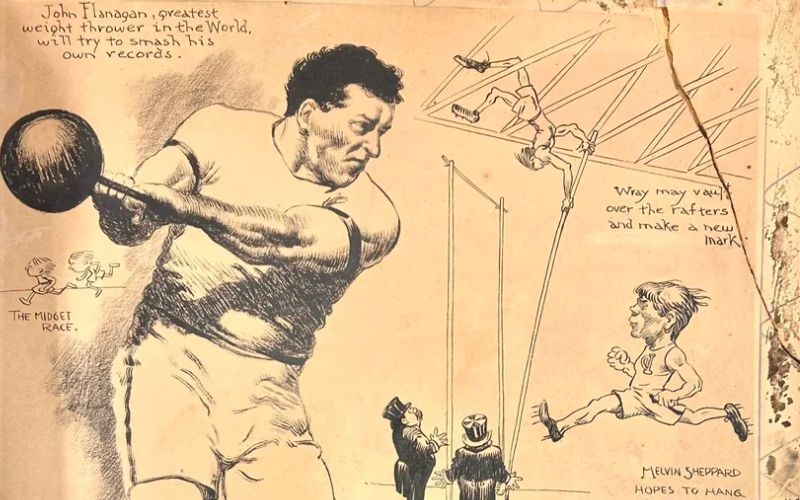Archbishop Timothy Dolan is taking another swing at the New York Times. Around this time last year, Dolan took to his blog to excoriate the Times for four articles and columns he considered anti-Catholic. (The public editor Clark Hoyt responded.) This time, Dolan is calling out the paper for covering an art show and a play which he says denigrate Catholics.
Dolan describes the group only in terms of how they offended Catholics, not how they helped people suffering from a disease neglected by politicians:
Secondly, it's disputable that anyone actually desecrated the Eucharist. If they did, I'm not here to condone that. Some protesters probably crossed the line and acted inappropriately. But in 1989, Act Up organized a protest of about 5,000 at St. Patrick's to speak out against the Church's political influence on public school sex education and the refusal to promote condom use to stop the spread of AIDS. It wasn't a bunch of rowdy gay men in leather assless chaps saying to each other, "Hey guys, let's take a break from ruining society with our gayness and interrupt some nice people praying!"
The other item in the Times that the archbishop points to in his cries of "anti-Catholic" is a 63-word summary, most of which is simply production information, for the play The Divine Sister. Yes, it's called "gleeful" by Ben Brantley. Yes, it features a cross-dressed nun. Yes, I'm sure it's irreverent. So write a letter to the playwright. The item is featured on the Times theater listing page, which also includes short write ups of dozens of other current plays. If this is Dolan's evidence for the paper's anti-Catholic bent, it's weaker than the Pope's apology for the (ongoing) sexual abuse scandal.
Not only that; the archbishop goes on to laud real-life nuns and call them "the most noble women around" without a hint of irony over the fact that the Church refuses to treat them equally to priests.
Dolan hams it up and tries to cast the Catholic Church as the lowly, downtrodden underdog, fodder for the big bad liberal media. It's a bad move. The Church wields too much power already in U.S. politics. It doesn't need to control the media as well.
He asserts that the Times would never dream of denigrating other ethnic/racial/religious groups, but doesn't think twice about insulting Catholics. What he misses here is that the Catholic Church is heavily involved in politics, thus opening itself up to respectful criticism from all citizens, and from the media.
The New York Times is not a perfect institution, and should be called out when it presents biased coverage. This, I'm afraid, is not one of those times.
The first offensive review is of "Activism, Art, and the AIDS Crisis, 1987-1993," an exhibition of Act Up propaganda/art from the time period. Act Up (AIDS Coalition to Unleash Power) played a pivotal role in getting the government to make AZT, a powerful drug that dramatically improves the lives of people with AIDS, cheaper and more accessible. They made over-the-top, can't-be-ignored political protests (sprinkling the ashes of those who died of AIDS on the White House lawn, staging "die-ins," etc.) and eventually they were heard.
"I’m talking about the common, casual way The New York Times offends Catholic sensitivity, something they would never think of doing — rightly so — to the Jewish, Black, Islamic, or gay communities."
Dolan describes the group only in terms of how they offended Catholics, not how they helped people suffering from a disease neglected by politicians:
"They invaded of [sic] St. Patrick’s Cathedral to disrupt prayer, trampled on the Holy Eucharist, insulted Cardinal Joseph Ratzinger when he was here for a conference, and yelled four letter words while exposing themselves to families and children leaving Mass at the Cathedral."There are two important things to note here. First of all, Dolan clearly has a problem with Act Up. Fine. But to call the Times, which covers every major art exhibit in the city, anti-Catholic for writing about this retrospective is illogical.
Secondly, it's disputable that anyone actually desecrated the Eucharist. If they did, I'm not here to condone that. Some protesters probably crossed the line and acted inappropriately. But in 1989, Act Up organized a protest of about 5,000 at St. Patrick's to speak out against the Church's political influence on public school sex education and the refusal to promote condom use to stop the spread of AIDS. It wasn't a bunch of rowdy gay men in leather assless chaps saying to each other, "Hey guys, let's take a break from ruining society with our gayness and interrupt some nice people praying!"
The other item in the Times that the archbishop points to in his cries of "anti-Catholic" is a 63-word summary, most of which is simply production information, for the play The Divine Sister. Yes, it's called "gleeful" by Ben Brantley. Yes, it features a cross-dressed nun. Yes, I'm sure it's irreverent. So write a letter to the playwright. The item is featured on the Times theater listing page, which also includes short write ups of dozens of other current plays. If this is Dolan's evidence for the paper's anti-Catholic bent, it's weaker than the Pope's apology for the (ongoing) sexual abuse scandal.
Not only that; the archbishop goes on to laud real-life nuns and call them "the most noble women around" without a hint of irony over the fact that the Church refuses to treat them equally to priests.
Dolan hams it up and tries to cast the Catholic Church as the lowly, downtrodden underdog, fodder for the big bad liberal media. It's a bad move. The Church wields too much power already in U.S. politics. It doesn't need to control the media as well.
He asserts that the Times would never dream of denigrating other ethnic/racial/religious groups, but doesn't think twice about insulting Catholics. What he misses here is that the Catholic Church is heavily involved in politics, thus opening itself up to respectful criticism from all citizens, and from the media.
The New York Times is not a perfect institution, and should be called out when it presents biased coverage. This, I'm afraid, is not one of those times.




Comments